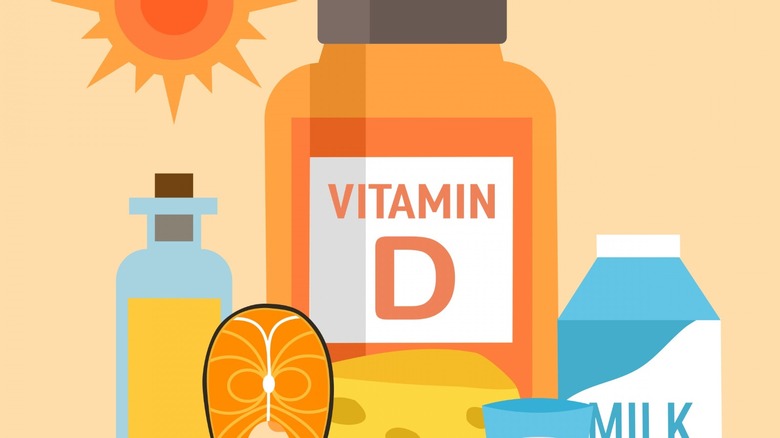Study Finds What A Boost Of Vitamin D Can Do For Your Brain Health
Our knowledge about the human brain has come a long way. Greek philosopher Aristotle, for example, believed that the brain was a "cooling agent" for the heart (via Stanford University). He also thought the heart was the commanding force of the mind. But Hippocrates — long before Aristotle announced the heart as the primary organ of the mind — suspected that the brain was the engine for sensation and intelligence (per Washington University). Eventually, advances in neuroscience and psychology would favor Hippocrates' theory of the brain.
The brain emerged as the vital organ for processes of the mind, and Descartes aside, the two became entangled. These advances in neuroscience have shifted the importance that we place on brain health. As a sign of the times, in 2013 then President of the United States Barack Obama created the Brain Research through Advancing Innovative Neurotechnologies (BRAIN) Initiative, which aimed to better understand the brain and promote health by exploring ways to cure, prevent, and treat brain diseases.
Today, health media is inundated with brain health tips to consider as you age. For example, the Mayo Clinic recommends the following tips to maintain a healthy brain throughout your life: proper sleep, exercise the body and mind, a Mediterranean diet, and staying socially connected. New research suggests that vitamin D may also be an important part of the healthy, aging brain.
Vitamin D and brain health
A 2022 study published in Alzheimer's & Dementia: The Journal of the Alzheimer's Association, looked at the brains of participants in the Rush Memory and Aging Project. Researchers sampled four brain regions for measurements of vitamin D levels — both before death and after death. Notably, participants did not have dementia upon entering the program. The researchers found that the after-death autopsies revealed that those participants with more vitamin D concentrations in the brain were associated with "better cognitive function prior to death." According to U.S. News & World Report, the findings do not indicate that vitamin D can protect against the development of brain diseases like dementia. Further, the researchers note that taking more than the daily recommendation for vitamin D — 600 IU daily for those aged 70 and under and 800 IU daily for those aged 71 and up — does not equate to better brain health.
Cleveland Clinic notes that taking too much vitamin D can be dangerous and lead to symptoms like confusion, loss of appetite, impaired speech, poor coordination, and nausea. You can get vitamin D from the sun, food, and supplements.


